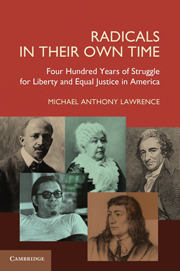Book contents
- Frontmatter
- Contents
- Illustrations
- Acknowledgments
- Introduction
- 1 Roger Williams (1603–1683): Freeborn
- 2 Thomas Paine (1737–1809): Revolution
- 3 Elizabeth Cady Stanton (1815–1902): Gender Wars
- 4 W. E. B. Du Bois (1868–1963): American Apartheid
- 5 Vine Deloria Jr. (1933–2005): Betrayals and Bridges
- Notes
- Index
4 - W. E. B. Du Bois (1868–1963): American Apartheid
Published online by Cambridge University Press: 05 June 2012
- Frontmatter
- Contents
- Illustrations
- Acknowledgments
- Introduction
- 1 Roger Williams (1603–1683): Freeborn
- 2 Thomas Paine (1737–1809): Revolution
- 3 Elizabeth Cady Stanton (1815–1902): Gender Wars
- 4 W. E. B. Du Bois (1868–1963): American Apartheid
- 5 Vine Deloria Jr. (1933–2005): Betrayals and Bridges
- Notes
- Index
Summary
The Negro race in America, stolen, ravished and degraded, struggling up through difficulties and oppression, needs sympathy and receives criticism; needs help and is given hindrance, needs protection and is given mobviolence, needs justice and is given charity, needs leadership and is given cowardice and apology, needs bread and is given a stone. This nation will never stand justified before God until these things are changed.
– W. E. B. Du Bois, 1905Great Barrington
The ten-year-old boy trembled with excitement as he and his classmates in the small wooden schoolhouse waited to begin exchanging their visiting cards. Glancing around, the boy saw his classmates arranging their cards and whispering to one another in excited tones.
“May I see yours?” one whispered.
“Yes,” another replied, offering a gorgeous folded paper creation for inspection. “They were ten cents a package.”
“Mine, too!”
When the teacher finally gave permission to begin, the boy and his classmates dashed from boy to girl, girl to boy, merrily collecting and dispensing cards.
Shortly, the boy approached a tall girl who had only recently moved to the school. He reached out his hand. “Here is a card for you,” he offered with a shy smile.
The girl looked at him briefly, dismissively refused his card, turned her back, and walked away.
The festive mood rushed out of the room like air from a balloon. Left standing with outstretched arm and burning cheeks, the embarrassed boy felt as if someone had punched him in the gut.
- Type
- Chapter
- Information
- Radicals in their Own TimeFour Hundred Years of Struggle for Liberty and Equal Justice in America, pp. 184 - 244Publisher: Cambridge University PressPrint publication year: 2010



